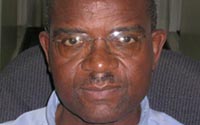ACCESSING ENERGY
ENERGY ACCESS FOR DEVELOPMENT.
By ERNEST MUPUNGA, Practical Action Southern Africa.
Too many of the world’s poorest people, especially in Zimbabwe, continue to live without adequate access to energy.
It’s clear that for people living in poverty, energy access is absolutely essential for a better life. The services provided by energy are needed in so many ways: cooking meals, lighting, refrigeration of food and medical supplies and for earning a living – the list goes on. And yet, too few leaders and decision-makers are concerned enough to act on the issue.
Using traditional forms of energy is a major burden – collecting firewood for cooking can take some women in Zimbabwe hours every day, and inhaling the smoke from cooking on open fires causes many health problems. A staggering 1.4 million people die each year globally as a result of inhaling smoke from traditional stoves.
Lighting is also an issue with kerosene lamps often being the only option for people to light their homes at night. Ivy Makowa from Chipendeke in Zimbabwe knows the dangers of these lamps only too well: “There is too much smoke. If you use it one night the next day you feel you have flu. You wake up and you have black smoke in your nose. You can be prone to long term disease caused by smoke. It builds up in our system. It causes coughs, bad lungs and other problems. We use even dried grass for lighting which is also full of smoke. It is dangerous to our health.”
The scale of the problem is truly daunting. Globally it is estimated that 3 billion people still cook using traditional biomass (such as wood, charcoal and dung) and 1.5 billion have no access to electricity. Recent progress on increasing the number of people with access to electricity has been commendable, but a disconnect remains between gaining electricity and realising development benefits, such as increased income and better health. Progress on reducing the number of people cooking with dirty fuels has been abysmal. At the current rate there will still be 3 billion people cooking with dirty fuels and 1.4 million people dying from indoor air pollution in 20 years time.
The millennium development goals (MDGs) remain all but out of reach in the period up to 2015. Although energy access arrived as a hot topic recently, it’s far too late for the MDGs. It is encouraging however, that it has been recognised as vital in terms of achieving the set goals.
Looking past the current MDGs, it’s important we have something to focus efforts on, and energy should be recognised in this. To this end the UN secretary general, Ban Ki-moon, launched the target of universal energy access by 2030. This is plausible goal and one that all governments should rally behind. Broad engagement from the development community and national governments should work to refine the goal and set intermediary targets.
Some find the link between energy access and climate change a source of tension, arguing that it is foolhardy, given that the world is hurtling towards dangerously high levels of carbon in the atmosphere, to encourage nearly half the world’s population to use more energy. This position is short-sighted and unjust. Meeting the basic energy needs of the entire world’s people would contribute less than 2% to current global emissions. People living in poverty should not be deprived of the opportunity to improve their lives because of the developed world’s historical profligacy.
We need a concerted and coherent approach to achieve universal energy access. The gravity of the issue needs to be met with financial support from donors, national governments and the private sector. Policies at international and national level should encourage a delivery ecosystem that’s fit for purpose, and practitioners need to focus on the impacts that can be realised with modern energy.
2012 has been declared the UN Year of Sustainable Energy for All. This is an opportunity to remove the climate blinkers from the energy debate and build support for energy access to reduce poverty.Right now, Practical Action needs people to call on the EC Development Commissioner,the man in charge of the the biggest development budget in the world, to commit to the goal of Energy for All by 2030.
You can sign up to the campaign here; www.practicalaction.org/makethecall.
The target of universal energy access by 2030 is attainable. We have the technology.We have the opportunity.We need champions to drive the energy access to the top of the international development agenda.
About the Author:
Ernest Mupunga is from Practical Action Southern Africa.
See: www.practicalaction.org

